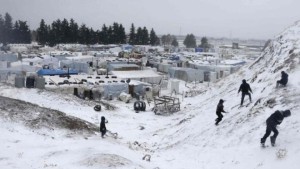The Easter bombing of civilians in a park in Lahore follows a long rise of religious extremism in Pakistan and a poisoning of public opinion towards minority faiths. The jihadist group that claimed responsibility for Sunday’s suicide bombing said they had targeted Christians, though most of the 72 killed were Muslims. On the same day, thousands of radicals began a four-day sit-in in Islamabad over the execution of a bodyguard who killed a provincial governor who had been a voice for religious tolerance. Yet the toxic religious atmosphere in Pakistan can’t be blamed entirely on jihadis on the periphery of society, or on the system of religious madrassas. In recent years in government-approved . schools, students are using textbooks that teach hostility towards all forms of thought and expression – except orthodox Sunni Islam.
Pakistani intellectuals and secular educators argue that the texts present a steady pitter patter of negative views on other faiths, on democracy and the West, that begin at the earliest grades and continue through high school graduation.The books claim that Christian, Hindu, Jewish, Sikh faiths, and even minority Muslim ethnic groups are inferior if not dangerous and should be opposed. They often present stereotyped images from history – the crusades in the Middle Ages, unjust colonial British civil servants, Jewish moneylenders, or of marauding Sikhs warriors – as if these are current affairs and represent popular views in the West and India today.The texts also adopt fundamentalist arguments that Muslim individuals are responsible for taking independent action against those who are not virtuous.Nearly 70 percent of Pakistani students attend public schools, according to the Center of Research and Security Studies. The Islamabad-based think tank points out that government committees decide on the content in curriculums. “The textbooks take the readers to an absolute point of view that stops students from thinking critically and takes them into isolated thinking,” says Khadim Hussain, a Peshawar-based writer on militancy and the director of an educational foundation.In a seventh-grade social studies text, students read: “History has no parallel to the extremely kind treatment of the Christians by the Muslims. Still the Christian kingdoms of Europe were constantly trying to gain control of Jerusalem.”Relations with Jews are presented in a seventh grade text in this way: “Some Jewish tribes also lived in Arabia. They lent money to workers and peasants on high rates of interest and usurped their earnings.”Sixth graders are taught that, “Christians and Europeans were not happy to see Muslims flourishing.”Seventh graders read, learn, and are tested on material from texts that teach the Crusades almost as current affairs and offer a very narrow view of Christianity without describing the nearly universal approbation against them taken later.”These wars are called crusades because the Pope, a head of the Christians, called a council of war,” the text states. “In this meeting he declared that Jesus Christ sanctioned war against Muslims.”
source:YAHOO




